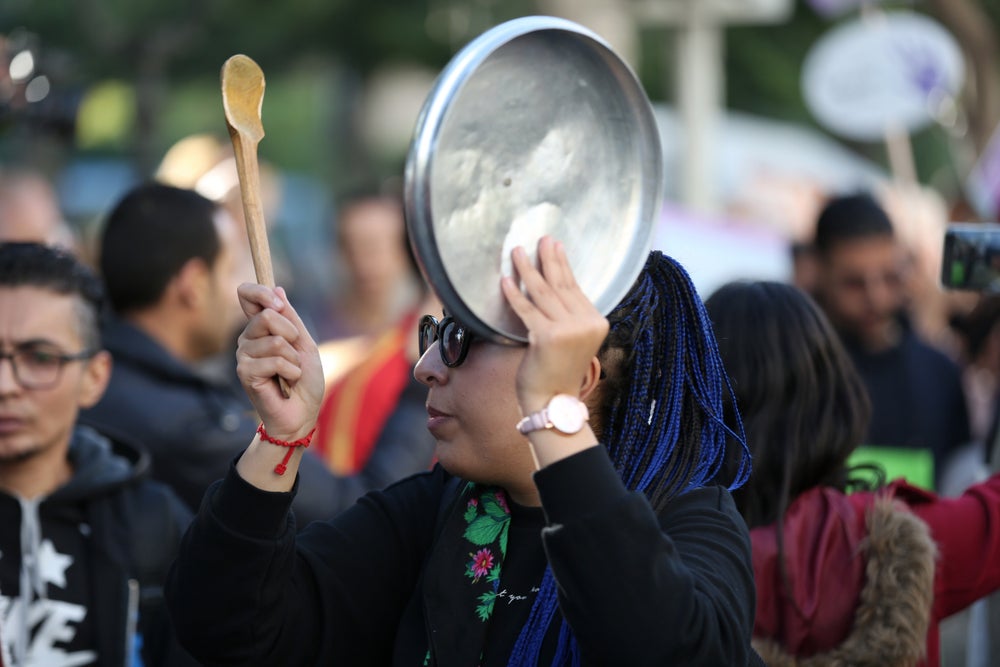 March to denounce violence against women on November 30, 2019 in Tunis, Tunisia. ( Mohamed Krit/ Shutterstock.com)
March to denounce violence against women on November 30, 2019 in Tunis, Tunisia. ( Mohamed Krit/ Shutterstock.com)
Tunisia is frequently cited as being at the forefront of women's rights in the Arab world because of the unique status of Tunisian women. Since the enactment of the Personal Status Code (PSC) in 1956, Tunisian women have played a greater role in the country's development. More recently, they played a vital role during the democratic transition in the aftermath of the revolution.
Since I took up my duties in Tunis, I have repeatedly observed the important place of Tunisian women in society and in the professional world. A growing number of women now occupy management positions at the highest levels of the civil service and the private sector. Moreover, the indicators are promising: the country ranks 4th in terms of gender equality in the MENA region. Tunisian women have a literacy rate of 72%, account for 42 % of higher education students, and hold 36 % of parliamentary seats.
However, could it be that these figures conceal a more nuanced reality and point out geographical and social disparity?
According to the Global Gender Gap report 2020, the World Economic Forum's publication on gender inequality, out of a total of 153 countries Tunisia's ranking in terms of gender equality dropped from 90th to 124th between 2006 and 2020. The trend in the overall index is reflected in the sub-indices. Tunisia thus moves from the 97th to the 142nd position in terms of economic participation and work opportunities, from the 76th to the 106th position in terms of education and from the 53rd to the 67th position in terms of political participation. Despite this seemingly good performance compared to other MENA countries, the trend in Tunisia is alarming, achievements are fragile and the road to equality remains long.
Indeed, while women represent 67% of higher education graduates, they account for only 24.6% of the employed population. Unemployment affects women twice as much (22.5%) as men (12.4%) and this disparity is even more exacerbated in the interior regions of the country (Gabès, Kasserine, Jendouba, Kébili, Gafsa and Tataouine) where the female unemployment rate is at 35% on average. Moreover, only 23.3% of new housing loans are granted to women, and women continue to be victims of global violence, i.e., at least one form of violence (physical, sexual, psychological or economic).
Despite their academic achievements, young women suffer from poor integration into economic life. The slowing down of recruitment in the public sector, a sector in which 39% of the workforce is female, is an important factor, but accounts only in part for this state of affairs. Other factors impede women's economic inclusion and empowerment, such as the lack of affordable and quality support systems for mothers struggling to reconcile work and family, labor laws, domestic violence, and the prevalence of more conservative attitudes and values than the PSC's progressiveness may suggest. These inequalities hamper the country's economic and social development by depriving it of part of its driving forces.
Violence against women is surprising in a country like Tunisia. Our team has learned with dismay that women entrepreneurs in the rural interior have been the targets of intimidation and violence, despite the fact that they enjoy the right to transform natural resources into high value-added products. Through an innovative approach that combines women's tradition (artisanal harvests) and entrepreneurship, these women offer an opportunity for inclusion and financial autonomy to other rural women. Preventing acts of violence is imperative in order to preserve women's economic rights and encourage a whole generation of young graduates from the interior of the country. The challenges of the COVID-19 crisis must not jeopardize the sometimes timid efforts at innovation and economic inclusion. Beyond the gender inequality that has no place in modern society, gender-based violence prevents women from entering and progressing in the labor market, from realizing their full potential and from setting an example for their children.
Finally, the lack of equality in terms of economic rights penalizes women, who are at a significant disadvantage in terms of access to credit, land ownership and financial products. This inequality hinders their entrepreneurial or commercial initiatives and affects their financial autonomy. According to the World Economic Forum's 2020 report on gender inequality, only 2.9% of Tunisian companies have a majority female capital. Thus, the importance of collaterals to lending decisions, combined with the inheritance code which provides that women inherit only half the share of men of the same degree of kinship, are major obstacles to women's economic rights. We must continue to hope that the last great project of the late President Essebsi concerning the right of inheritance will be realized in order to overcome this fundamental inequality.
The energy, courage and dynamism of today's Tunisian woman remain a unique element in a region where gender inequality persists. Just like their mothers and grandmothers who, in the 60s and 70s, invested in many professional fields, whether in the health or education sectors, in the civil service or private companies, young women today can innovate. They integrate the sectors of the future, the most sophisticated start-ups and master the most sophisticated professions. The Tunisian state is expected to encourage this spirit of innovation, by protecting women from the violence of the status quo advocates, by guaranteeing their economic rights and by offering them equal opportunities at work and at school. That's what democracy is all about.


Join the Conversation